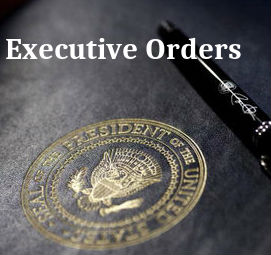by | ARTICLES, BLOG, CONSTITUTION, ELECTIONS, FREEDOM, GOVERNMENT, OBAMA, POLITICS, TAXES
Will the Republicans take the Senate? Election Day Links (to be updated periodically)
Republicans sense power shift; Dems rev up damage control
WASH POST: 97% CHANCE GOP TAKES SENATE
CNN 95%
NYT: 70%
PAPER: Where did O go wrong?
NYT: Irate Electorate…
Most ads on Obamacare…
WH Strategist: Dems Running from President ‘Look Like Chickensh*t’…
Guide to What to Watch for on Election Night…
Harry Reid’s fateful evening…
30 year old Republican set to be youngest congresswoman in history…
by | ARTICLES, CONSTITUTION, ELECTIONS, FREEDOM, GOVERNMENT, OBAMA, POLITICS
Last week on October 7, it was reported that Liberia’s President, Ellen Johnson Sirleaf, asked for more emergency powers to help contain and prevent the current Ebola crisis. Liberia is already under a state of emergency and curfew, which began in August. But according to VOA News:
“In a letter to the Plenary of the House of Representatives and the Senate, Sirleaf asked for powers to amend seven different articles under the constitution, including freedom of movement, speech, religion, confiscation of private property, and elections.”
Besides asking for extra powers, and citing the current “state of emergency”, President Sirleaf then proceeded on October 8th to suspend nationwide elections for Senate due to be held later this month. Yahoo News reported that,
“Almost three million voters had been due to take part in Senate polls on Tuesday but organisers said there was no way a “mass movement, deployment and gathering of people” could go ahead without endangering lives.”. A presidential proclamation claimed the state of emergency allowed her to “to suspend… any and all rights ordinarily exercised, enjoyed and guaranteed to citizens.”
You can read her power request letter here.
One chilling request is that “the president has asked for a temporary extension of the state of emergency removing a constitutional right to make public speeches which could “undermine” the response to the epidemic.”
Opposition to the election suspension was swift. Tokpa Mulbah, a member of the House of Representatives from the People Unification Party, stated that “The Chief Executive, Madam Sirleaf, does not have that constitutional authority to make such a pronouncement. So based on that, we will be drafting a resolution Thursday to be sent to the Liberian Senate for a vote and placed in front Madam Sirleaf to sign so that the Elections Commission can go ahead to conduct elections from now till December 30 so that come second Tuesday in January the new 15 senators will be able to take their seats.”
In fact, the House went on to vote to reject Sileaf’s request “for more powers to restrict freedom of Movements, speech, religion, assembly and of the press, as well as property rights, through a motion filed by Representative Brown. Both Houses, in a Joint Resolution passed on Friday, October 10, 2014, unanimously voted to overturn a President Sirleaf’s decision to indefinitely cancel the October 14 Mid Term Senatorial elections.”
Is is unclear if the Senate concurred with the House. According to AllAfrica, the Senate is torn and is still debating.
Freedom of the Press has also been under attack since the curfew. Apparently, “journalists were not included on a list of exempted professions able to move freely around the country at night. (They were added six days later.) In early October, citing privacy concerns, the government announced that reporters could be arrested for speaking with Ebola patients or photographing treatment centers without written permission from the health ministry.” Further information regarding the freedom of the press during the Ebola crisis can be found here.
Liberia spent two decades of civil war, and the election of President Sirleaf was seen as a more stable, constitutional rule. Liberians should reject this attempted power grab, even in the midst of such a tragic time in their country, in order to safeguard their liberties for the long-haul.
by | ARTICLES, CONSTITUTION, GOVERNMENT, OBAMA, OBAMACARE, POLITICS, TAXES

Thanks to the folks over at CATO, we have a video of the current IRS Commissioner John Koskinen, speaking before the Ways and Means Health Subcommittee early this week. He was being questioned about taxes and Obamacare, and asked about subsidies being repaid.
Chairman Brady said, “The law in that case is that there is not a cap. Subsidies must be repaid. Will you be following the law in that recapture?”
Koskinen replied, “Yes, wherever we can, we follow the law.”
In other words, following the law is a “can”, not a “must”.
With regard to Koskinen’s remarks, Forbes had an interesting observation:
“Numerous Treasury and IRS staffers have told investigators from the House Committee on Oversight and Government Reform that they knew back in 2011 that the Patient Protection and Affordable Care Act didn’t authorize them to issue health-insurance subsidies through Exchanges established by the federal government. But they did so anyway. (And now they’re in court.) The Wall Street Journal‘s Kim Strassel writes about it here.
Given that context, Koskinen’s remark seems like an admission that the IRS sees the law more as a set of guidelines”.
Indeed. I wonder if anyone was to get audited by the IRS, that they could use the phrase “Wherever we can, we follow the law” successfully in their defense.
by | ARTICLES, CONSTITUTION, FREEDOM, GOVERNMENT, OBAMA, POLITICS

Lately there have been recent discussion about whether or not Congress can sue the President. We have had several occurrences, in fact, where the President has violated the Constitution by overreaching his authority with regard to Congress. In these instances, Congress should have the standing to sue the President.
When Congress has acted in its authority as the Legislative branch, that institution as a whole has been compromised when the President, acting as the Executive branch, has ignored the actions of Congress and acted unilaterally in a manner other than that which was decided by Congress.
For instance, Congress voted for Obamacare. It contained some 2000 pages of laws, rules, and regulations. And yet dozens of times since the implementation of the law (March 2010), parts of the law been ignored, delayed, or changed by the President or some of his agencies — directly contrary to the actions of Congress crafting and passing a law.
In an even more obtuse example, Obama passed the Dream Act on his own. Though the president wanted it, Congress did its institutional job and it did not pass. Instead of letting the matter end there, as proscribed by the Constitution, the president implemented it anyway.
The crux here lies in understanding the will of the people. Indeed, Thomas Jefferson aptly remarked that, “The will of the people is the only legitimate foundation of any government, and to protect its free expression should be our first object.”
Remember, Congress (composed of elected representatives) is the Legislative Branch. Under the Constitution, the Executive Branch has no direct power to pass legislation. That power lies solely with Congress. Therefore, if Congress does not create and pass a particular law, it is because the people don’t will it. That is the free expression of their Constitutional power.
When the President says, “I have to act because Congress does not”, he violates the will of the people with a gross overreach of Executive authority.
Part of the current problem lies in the fact that Obama’s actions are allowed to stand because no one fights it. If this continues without a challenge, then future successors in the Executive branch can — and will — point to Obama and say “Obama did it, so now we can too”.
So let’s get this clarified once and for all that the constitutionality of some of Obama’s actions are not correct. When Obama has acted directly contrary to a decision made by the institution of Congress — creating a law after Congress has declined to do so, or changing a law passed by Congress — he threatens the institution of the Legislative Branch itself and the will of the people as a whole. We have the will of the people through Congress, not the majority of the people’s opinion as defined by the latest poll question.
The three branches of government, and their checks and balances, must be meticulously maintained. A lawsuit on behalf of the institution of Congress to the President regarding powers specifically granted and not granted (including the lawmaking powers), is a necessary safeguard for our Constitutional Republic.
by | ARTICLES, CONSTITUTION, FREEDOM, GOVERNMENT, OBAMA, POLITICS

As if the recent letter from the Inspectors General to Congress wasn’t enough, there’s a new story about apparent interference from the Feds into an Inspector General report.
The Washington Post reports today about an incident in which an Inspector General for the Commerce department received a “filtered” version that watered down telework abuse incidents in the U.S. Patent Office.
The original report, seen here described “‘fundamental issues’ with the business model of the patent office”, and that oversight was “Oversight of the telework program — and of examiners based at the Alexandria headquarters — was “completely ineffective,”.
The final report was only 16 pages, compared to the original one, which was twice the size.
The report confirmed the fears allayed in the aforementioned letter to Congress: The post reports that “Investigators recommended “unmitigated access” to records when abuse is suspected.
The version supplied to the inspector general, though, explained that managers did not provide full access to computer records that could substantiate allegations of fraud because officials did not want to be seen as “big brother” through electronic surveillance.”
This is in direct violation to the Inspector General Act of 1978, which mandates that each Inspector General is to “have access to all records, reports, audits, reviews, documents, papers, recommendations, or other material available”. And yet, this tactic is growing all-too-common with regard to Inspectors General and their ability to audit the federal government for waste, fraud, and mismanagement.
by | ARTICLES, CONSTITUTION, FREEDOM, GOVERNMENT, HYPOCRISY, OBAMA, POLITICS, TAXES

Inspectors General (yes, that’s the plural) are considered watchdogs for the government. Their jobs primarily focus on “uncovering waste, fraud, and mismanagement”, which is an important function to keep government programs and agencies in check.
A serious breach of trust is evident, therefore, when 47 of 73 Inspectors General pen a letter to Congress describing “serious limitations on access to records.” That’s 64% of the total watchdogs who express such concerns. You can read the letter here:
The letter takes aim at primarily three agencies: the General at the Peace Corps, the Environmental Protection Agency, and the Department of Justice. These Inspectors General “recently faced restrictions on their access to certain records available to their agencies that were needed to perform their oversight work in critical areas.” The restrictions were not limited to just those Inspectors General; hence the overwhelming need to pen a letter to Congress. The Inspectors General described how other
“Inspectors General have, from time to time, faced similar obstacles to their work, whether on a claim that some other law or principle trumped the clear mandate of the IG Act or by the agency’s imposition of unnecessarily burdensome administrative conditions on access. Even when we are ultimately able toresolve these issues with senior agency leadership, the process is often lengthy, delays our work, and diverts time and attention from substantive oversight activities. This plainly is not what Congress intended when it passed the IG Act.
The Inspector General Act of 1978 is clear. The pertinent statute that relates to access is Section §6: Authority of Inspector General; information and assistance from Federal agencies; unreasonable refusal; office space and equipment. It patently states:
(a) In addition to the authority otherwise provided by this Act, each Inspector General, in
carrying out the provisions of this Act, is authorized—
(1) to have access to all records, reports, audits, reviews, documents, papers, recommendations,
or other material available to the applicable establishment which relate to programs and
operations with respect to which that Inspector General has responsibilities under this Act
The full text of the law can be found here:
The letter to Congress was addressed to the Honorable Darrell Issa, the Honorable Thomas R. Carper, The Honorable Elijah Cummings, and The Honorable Tom Coburn. What made the letter particularly notable, however, was its size and scope.
Darrell Issa described, “I’ve never seen a letter like this, and my folks have checked — there has never been a letter even with a dozen IGs complaining. This is the majority of all inspectors general saying not just in the examples they gave, but government wide, they see a pattern that is making them unable to do their job.”
Reading the official website for Inspectors General, one can see they pride themselves on service, “whose primary responsibilities, to the American public, are to detect and prevent fraud, waste, abuse, and violations of law and to promote economy, efficiency and effectiveness in the operations of the Federal Government.”
The fact that the majority of the Inspectors General find themselves unable to perform their duties to audit the federal government is quite troubling, because it is another example of the “most transparent administration” choosing to willfully cloak themselves in secrecy. Stonewalling the very agents — who have a duty to the American people to keep government in check — is another tactical abuse of power.
by | ARTICLES, CONSTITUTION, FREEDOM, GOVERNMENT, OBAMA, POLITICS

The Washington Post reports that a vote to sue President Obama for overreach of powers passed in the House. No Democrats supported the measure as well as 5 Republicans who also voted no.
Here’s where the mess begins. Most Americans are unaware of how the government actually works. Here’s all the nuances pertaining to Congressional and Executive power.
The Legislative branch, Congress, has the power to pass laws.
The Constitution does not grant specific permission for the Executive branch to issue executive orders.
Presidents have used Executive Orders to assist the officers of the Executive Branch (federal agencies) to carry out their duties.
In a court case in 1952, Youngstown Sheet & Tube Co. v. Sawyer, 343 US 579 the Supreme Court ruled that an Executive Order issued by President Truman, which placed all steel mills in the country under federal authority, was “not valid because it attempted to make law, rather than clarify or act to further a law put forth by the Congress or the Constitution”.
And more:
“The Youngstown decision was critical because it established a standard for the exercise of executive power. In his concurring opinion, Justice Robert H. Jackson described three different situations and three corresponding levels of presidential authority:
The president acts with the most authority when he has the “express or implied” consent of Congress
The president has uncertain authority in situations where Congress has not imposed its authority — either by inaction or indifference — and the president takes advantage of this “zone of twilight” to make an executive decision
The president acts with the least authority when he issues an executive order that is “incompatible” with the expressed or implied will of Congress. Such an act, wrote Justice Jackson, threatens the “equilibrium established by our Constitutional system” [source: Contrubis]”
Executive Orders are not meant to create new laws. Nevertheless, Presidents have, in recent years, pushed the envelope in this matter, using “the executive order as an increasingly powerful political weapon, pushing through programs and regulations — often controversial in nature — without Congressional or judicial oversight [source: Savage]. Executive orders can be overruled by the courts or nullified by legislators after the fact, but until then they carry the full weight of federal and state law [source: Contrubis]”
Obama’s response to the lawsuit vote was this:
“They’re going to sue me for taking executive actions to help people. So they’re mad I’m doing my job. And by the way, I’ve told them I’d be happy to do it with you. The only reason I’m doing it on my own is because you’re [Congress] not doing anything,”
One could argue that Obama’s response magnifies the problem. Obama’s job is not to take “executive actions to help people”. His job, per the Constitution, is to “take care that the laws be faithfully executed”. If Congress isn’t doing anything, that doesn’t mean the power to make laws, the Legislative Branch, is abrogated to the Executive Branch.
If Congress does not create and pass a particular law, it is because the people don’t will it. That is a free expression of Congress’s Constitutional power.
When the President says, “I have to act because Congress does not”, it can be argued that he violates the will of the people with a gross overreach of Executive authority.
Legal scholars have weighed in, suggesting that if Congress acts as one body with this lawsuit — in this case, the House passing the measure to sue — they will have decent Congressional standing from a legal perspective. Here’s more on how that works
Because this really has not been done before, it will likely take a long time to settle the matter. Stay tuned.
by | ARTICLES, BLOG, CONSTITUTION, ELECTIONS, FREEDOM, GOVERNMENT, OBAMA, OBAMACARE, POLITICS, TAXES

A federal appeals panel handed down a ruling this morning that could be problematic for Obamacare. As just reported, “A judicial panel in a 2-1 ruling said such subsidies can be granted only to those people who bought insurance in an Obamacare exchange run by an individual state or the District of Columbia — not on the federally run exchange HealthCare.gov.” You can read the entire appeal here.
This is the eagerly awaited Halbig case. The crux of the case lies in the wording of the actual bill of Obamacare, which specifically lists state exchanges as a source of subsidies.
There is no mention of federal exchanges in Obamacare. This was created merely by an IRS rule authorizing the subsidies in federal exchanges. If upheld, it could affect millions of Obamacare enrollees. The article notes,
“the ruling could lead many, if not most of those subsidized customers to abandon their health plans sold on HealthCare.gov because they no longer would find them affordable without the often-lucrative tax credits. And if that coverage then is not affordable for them as defined by the Obamacare law, those people will no longer be bound by the law’s mandate to have health insurance by this year or pay a fine next year.
If there were to be a large exodus of subsidized customers from the HealthCare.gov plans, it would in turn likely lead to much higher premium rates for non-subsidized people who would remain in those plans, who are apt as a group to be in worse health than all original enrollees.”
The government will most certainly file a full review in U.S. Court of Appeals for the District of Columbia Circuit.
Regardless of the eventual outcome of the case here’s the salient point to take away.
When you look at the plain wording of the actual bill, it really doesn’t make any sense (e.g. common sense). Here we have a perfect example of the Democrats trying — and ultimately succeeding — to push something through without looking at it or even carefully thinking through the implications of the words and provisions. That is not a “glitch”. That is disdain.
Obamacare was drafted badly, and they couldn’t even get it corrected the proper way because of the crookedness by which it was passed. Now we have a stupid mistake that the judiciary is being asked to fix. And that’s the problem.
What the government is asking the courts to do is to ignore the literal wording of the law. On the other hand, if the literal wording is indeed upheld, the immediate effect of a reversal is going to be extremely terrible.
Think about it: the IRS will have to go after people for refunds of tax credits. That will be a messy and slow and heated endeavor. Many people, especially poor people, are going to argue that they wouldn’t have used Obamacare insurance if it wasn’t for the subsidies. From a tactical perspective, such a scenario is not necessarily good for conservative or libertarians either, because it sets up the sound-byte narratives that conservatives and libertarians are “taking away your health care”, “they hate the poor, etc”, which will most certainly be used ad nauseam by the Democrats. Is it worth it?
My heart of hearts wants literal side to win, but at the same time, I’m not entirely convinced that its the best thing in the long run. Yet, if the government wins, it reinforces the precedent we’ve been seeing that it is okay to ignore the actual wording of the law passed by Congress. That most certainly is not okay.
This case perfectly highlights the stupidity and utter contempt for which the Democrats have of procedure and law, as seen in the problems with the entire Obamacare bill.
UPDATE: Allahpundit reminds us that the 4th Circuit upheld the Obamacare subsidies for federal exchange consumers.
So…which is it? Is it the intent of the law or the text of the law? Stay tuned on this one.
by | ARTICLES, BLOG, CONSTITUTION, FREEDOM, GOVERNMENT, OBAMA, POLITICS, TAXES

First Lois Lerner’s home computer crashed. Then it was seven IRS employees, many who had important positions. You can read about them here. Now, according to the Daily Caller, the IRS Deputy Associate Chief Counsel Thomas Kane reported in congressional testimony that even more IRS officials succumbed to computer crashes. He estimated that the number was no more than 20. Kane also stated that the IRS does not know yet if those lost emails are backed up anywhere.
Last month in June, the IRS commissioner John Koskinen testified that he did not know of any way to get missing IRS emails back, which was in contrast to his March testimony that IRS employee emails are saved on servers. In that interim time between the two testimonies, it was learned that in September of 2011, the IRS canceled its contract with an email archiving firm after 6 years.
The names of the newest IRS crash victims include: “David Fish, who routinely corresponded with Lois Lerner, as well as Lerner subordinate Andy Megosh, Lerner’s technical adviser Justin Lowe, and Cincinnati-based agent Kimberly Kitchens”.
The IRS computer crashes happened in both Washington DC and Cincinnati. Additionally, it appears that the IRS violated the The Federal Records Act, which required IRS employees to save and also print out all of their emails related to IRS business — in the unlucky event a hard drive crashed or was deleted in an improper data recycling procedure.
UPDATE: Even as the IRS scandal continues to worsen, the IRS brazenly put out a new solicitation on Monday for “media destruction” services to destroy at least another 3,200 hard drives.
You can’t make this up.
by | BLOG, BUSINESS, CONSTITUTION, ECONOMY, OBAMA, OBAMACARE, POLITICS, TAXES

The next big case related to Obamacare, Halbig v. Burwell, is sitting in the U.S. Court of Appeals for the D.C. Circuit. The verdict should be announced soon. The crux of the case lies in the wording of the actual bill of Obamacare, which specifically lists state exchanges as a source of subsidies.
There is no mention of federal exchanges in Obamacare. This was created merely by an IRS rule authorizing the subsidies in federal exchanges.
Regardless of the outcome of the case (for a primer, click here), here’s the salient point to take away.
When you look at the plain wording of the actual bill, it really doesn’t make any sense (common sense). Here we have a perfect example of the Democrats trying — and ultimately succeeding — to push something through without looking at it or even carefully thinking through the implications of the words and provisions.
Obamacare was drafted badly, and they couldn’t even get it corrected the proper way because of the crookedness by which it was passed. Now we have a stupid mistake that the judiciary is being asked to fix. And that’s the problem.
What the government is asking the courts to do is to ignore the literal wording of the law. On the other hand, if the literal wording is indeed upheld, the immediate effect of a reversal is going to be extremely terrible.
Think about it. The IRS will have to go after people for refunds of tax credits. That will be a messy and slow and heated endeavor. Many people, especially poor people, are going to argue that they wouldn’t have used Obamacare insurance if it wasn’t for the subsidies. Not sure if that scenario is ultimately good for conservative or libertarians either, because it certainly sets up the sound-byte narratives that conservatives and libertarians want to “take away your health care”, “they hate the poor, etc”. Is it worth it?
My heart of hearts wants literal side to win, but at the same time, I’m not entirely convinced that its the best thing in the long run. Yet, if the government wins, it reinforces the precedent we’ve been seeing that it is okay to ignore the actual wording of the law, much in the same fashion that the wording of the Constitution is being ignored in some instances.
This case perfectly highlights the stupidity and utter disdain for which the Democrats have of procedure and law.






